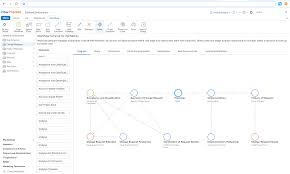Software development management is the process of overseeing and organizing the creation of software products. It involves coordinating various teams and resources to ensure that a project is completed on time, within budget, and to the satisfaction of all stakeholders. Effective software development management requires a deep understanding of software engineering principles, project management methodologies, and leadership skills.
One of the key responsibilities of a software development manager is to define the scope of a project. This involves working with stakeholders to identify their needs and requirements, as well as determining what resources will be required to complete the project. Once these parameters have been established, the manager will create a project plan that outlines timelines, budgets, and deliverables.
Another important aspect of software development management is team coordination. The manager must ensure that all members of the team are working together effectively and efficiently towards a common goal. This may involve assigning tasks, setting deadlines, and monitoring progress to ensure that everyone is on track.
In addition to managing teams, software development managers must also be skilled in resource allocation. They must determine what tools and technologies are required for a project, as well as what personnel will be needed to execute it successfully. This may involve hiring new staff or outsourcing work to third-party vendors.
Risk management is also an important component of software development management. The manager must identify potential risks that could impact the success of a project and develop strategies for mitigating them. This may involve contingency planning or developing backup plans in case something goes wrong.
Finally, effective communication is critical for successful software development management. The manager must be able to communicate effectively with stakeholders at all levels – from executives to developers – in order to keep everyone informed about project status and progress.
In summary, software development management is an essential process for ensuring that projects are completed on time, within budget, and meet stakeholder expectations. It involves coordinating teams and resources effectively while managing risk and communicating effectively with all stakeholders involved in the project. A skilled software development manager can help ensure the success of any software development project.
6 Key Benefits of Effective Software Development Management
- Improved communication between stakeholders and developers
- Increased efficiency in the development process
- Reduced costs associated with software development projects
- Enhanced ability to track progress and identify potential issues early on
- Improved quality of the end product through greater oversight of the development process
- Increased customer satisfaction by meeting deadlines and delivering features on time
Challenges in Software Development Management: Navigating Cost, Time, Complexity, Risk, Collaboration, and Visibility
Improved communication between stakeholders and developers
Effective communication is essential for the success of any software development project. One of the key benefits of software development management is improved communication between stakeholders and developers. This is achieved through a variety of methods, including regular meetings, status reports, and project documentation.
By establishing clear lines of communication between stakeholders and developers, software development managers can ensure that everyone is on the same page when it comes to project goals, timelines, and deliverables. This helps to prevent misunderstandings and can reduce the risk of costly mistakes or delays.
Improved communication also helps to build trust between stakeholders and developers. When stakeholders are kept informed about project progress and are able to provide input along the way, they are more likely to feel invested in the project’s success. This can help to build a sense of teamwork and collaboration that can be invaluable in achieving project goals.
Another benefit of improved communication is that it can help to identify potential issues early on in the development process. By regularly checking in with stakeholders and developers, software development managers can catch problems before they become major roadblocks. This allows for quick resolution and helps to keep projects on track.
In conclusion, improved communication between stakeholders and developers is a key pro of software development management. It leads to better collaboration, increased trust, and a more efficient development process overall. By prioritizing effective communication strategies, software development managers can help ensure the success of any software development project.
Increased efficiency in the development process
One of the major benefits of software development management is increased efficiency in the development process. With effective management, software development teams can work more efficiently and effectively towards a common goal. This results in faster delivery times, higher quality products, and ultimately greater customer satisfaction.
Effective software development management involves breaking down complex tasks into smaller, more manageable components. This allows team members to focus on specific tasks and complete them more efficiently. By breaking down tasks into smaller components, managers can also identify potential bottlenecks or areas where additional resources may be needed.
In addition to task breakdowns, effective software development management also involves setting clear goals and objectives for the team. This helps to keep everyone focused on what needs to be accomplished and ensures that everyone is working towards a common goal. Clear goals also help to keep team members motivated and engaged in the project.
Another key aspect of software development management is resource allocation. Managers must determine what resources are required for a project and allocate them appropriately. This includes personnel, tools, and technologies needed to complete the project successfully. Effective resource allocation can help ensure that teams have everything they need to work efficiently and effectively.
Finally, software development managers must track progress throughout the development process. They must monitor milestones, deadlines, and deliverables to ensure that everything is on track. By tracking progress regularly, managers can identify potential delays or issues before they become major problems.
In conclusion, effective software development management can significantly increase efficiency in the development process. By breaking down complex tasks into smaller components, setting clear goals and objectives, allocating resources appropriately, and tracking progress regularly – managers can help teams work more efficiently towards a common goal. Ultimately this results in faster delivery times, higher quality products and greater customer satisfaction – all of which are essential for success in today’s competitive business environment.
Reduced costs associated with software development projects
One of the major advantages of software development management is the potential for reduced costs associated with software development projects. Effective management can help to identify areas where costs can be reduced or eliminated, resulting in significant savings for the organization.
One way that software development management can reduce costs is by improving efficiency. By coordinating teams and resources effectively, managers can ensure that tasks are completed on time and without unnecessary delays. This can help to minimize the amount of time and resources required to complete a project, resulting in lower costs.
Another way that software development management can reduce costs is by identifying and addressing issues early in the development process. By conducting regular reviews and testing throughout the project lifecycle, managers can identify potential problems before they become more costly to fix later on. This proactive approach helps to minimize rework and ensures that projects are completed on time and within budget.
Effective software development management also involves careful resource allocation. By determining what tools and technologies are required for a project, as well as what personnel will be needed to execute it successfully, managers can ensure that resources are used efficiently. This may involve outsourcing work to third-party vendors or hiring new staff with specialized skills when needed.
Finally, good communication is key to reducing costs associated with software development projects. By keeping stakeholders informed about project status and progress, managers can avoid misunderstandings or miscommunications that could lead to costly delays or rework.
In conclusion, effective software development management has many benefits, including reduced costs associated with software development projects. By improving efficiency, identifying issues early in the process, careful resource allocation, and good communication practices, managers can help organizations save money while delivering high-quality products on time and within budget.
Enhanced ability to track progress and identify potential issues early on
One of the key benefits of software development management is the enhanced ability to track progress and identify potential issues early on. By having a clear project plan in place, software development managers can easily monitor progress against milestones and identify any areas where work may be falling behind schedule.
This level of visibility allows managers to take proactive steps to address issues before they become major problems. For example, if a team is falling behind on a particular task, the manager can reassign resources or adjust timelines to ensure that the project stays on track.
In addition, software development management tools often include features that allow managers to quickly identify potential risks or roadblocks. This may involve setting up alerts for issues such as missed deadlines or budget overruns, so that managers can take corrective action before these issues escalate.
Overall, the enhanced ability to track progress and identify potential issues early on is a major advantage of software development management. By having this level of visibility into a project, managers can make informed decisions and take proactive steps to ensure that projects are completed successfully and on time.
Improved quality of the end product through greater oversight of the development process
One of the key benefits of software development management is the improved quality of the end product. With greater oversight of the development process, managers can ensure that every aspect of the project is completed to a high standard.
Through effective project planning and team coordination, software development managers can identify potential issues early on and take steps to address them before they become major problems. This may involve conducting regular code reviews or implementing automated testing tools to catch bugs before they make it into the final product.
Additionally, by managing resources effectively and allocating tasks appropriately, software development managers can ensure that each member of the team is working on tasks that align with their strengths and skills. This can lead to more efficient and effective development processes, resulting in a higher-quality end product.
Finally, effective communication with stakeholders throughout the development process can help ensure that everyone is on the same page regarding project goals and expectations. This can help prevent misunderstandings or miscommunications that could impact the quality of the final product.
In summary, improved quality is a significant benefit of software development management. By providing greater oversight of the development process, managers can identify potential issues early on, allocate resources effectively, and communicate with stakeholders to ensure that everyone is working towards a common goal. The end result is a higher-quality product that meets stakeholder expectations and delivers value to users.
Increased customer satisfaction by meeting deadlines and delivering features on time
One of the key benefits of software development management is increased customer satisfaction. By meeting deadlines and delivering features on time, software development managers can ensure that customers are happy with the final product and that it meets their expectations.
When a software project is managed effectively, it is more likely to be completed on time and within budget. This means that customers can receive the product they need when they need it, without having to wait for extended periods or experience unexpected delays.
Furthermore, effective software development management allows for greater transparency throughout the development process. Customers can be kept informed about progress and potential issues, which helps to build trust and confidence in the development team. This also allows for greater collaboration between the development team and customers, which can result in a better end product that meets all requirements.
In addition to meeting deadlines and delivering features on time, effective software development management also helps to ensure quality control. By implementing testing procedures and quality assurance measures throughout the development process, managers can ensure that the final product meets all necessary standards and is free from errors or bugs.
Overall, increased customer satisfaction is a major benefit of software development management. By meeting deadlines, delivering features on time, maintaining transparency throughout the process, and ensuring quality control measures are in place, managers can help to build trust with customers while delivering a high-quality end product.
Costly
One of the major cons of software development management is its cost. Developing and managing software projects requires specialized tools and personnel, which can be quite expensive. The need for specialized software tools such as project management software, collaboration tools, and testing tools can add up to a significant cost.
In addition to the cost of software tools, personnel costs can also be a major expense. Experienced software development managers are in high demand and command high salaries. Hiring developers and other technical staff can also be costly, particularly if they possess specialized skills.
Furthermore, there may be additional costs associated with training staff on new tools or technologies that are required for a project. This training can take time and resources away from other tasks and may impact the overall timeline of a project.
While costly, it is important to note that effective software development management is an investment in the success of a project. Properly managed projects are more likely to be completed on time, within budget, and meet stakeholder expectations. In contrast, poorly managed projects can result in additional costs due to delays or rework.
To mitigate the costs associated with software development management, it is important for organizations to carefully plan their resources and budget accordingly. This may involve outsourcing certain aspects of a project or investing in training programs for existing staff members.
In conclusion, while costly, effective software development management is crucial for successful project delivery. By carefully planning resources and budgeting accordingly, organizations can minimize the financial impact of this necessary investment in their business operations.
Time-consuming
One of the major drawbacks of software development management is that it can be a time-consuming process. The development of software is a complex and intricate process that requires careful planning, execution, and management. Unfortunately, unexpected delays or changes in requirements can cause significant setbacks and extend the timeline for completing a project.
One of the primary reasons why software development management can be time-consuming is that it involves multiple phases. From the initial planning phase to the final testing and release, there are numerous steps involved in developing software. Each phase requires careful attention to detail and coordination with team members to ensure that everything is proceeding as planned.
Another factor that can contribute to delays in software development management is changes in requirements. As stakeholders become more involved in the process, they may request changes or additions to the original scope of the project. While these requests may be necessary for meeting business needs or improving functionality, they can also add significant time to the development process.
Finally, unexpected delays such as hardware failures or unforeseen technical issues can also cause significant setbacks in software development management. These types of issues require additional troubleshooting and testing to resolve, which can extend the timeline for completing a project.
Despite these challenges, effective software development management can help mitigate some of these risks and reduce delays. By carefully planning each phase of the project and anticipating potential roadblocks, managers can proactively address issues before they become major problems. Additionally, effective communication with stakeholders throughout the process can help manage expectations and reduce surprises.
In conclusion, while time-consuming, software development management is a critical process for ensuring successful completion of projects. By understanding potential risks and implementing strategies to mitigate them, managers can help minimize delays and ensure that projects are completed on time and within budget.
Complexity
One of the major cons of software development management is the inherent complexity of the process. Managing software development requires a deep understanding of technical concepts and processes that can be difficult for non-technical personnel to grasp. This can lead to miscommunication, misunderstandings, and delays in project completion.
Software development involves a wide range of technical skills, including programming languages, database management, and software architecture. Understanding these concepts requires specialized knowledge and experience that may not be readily available to all members of a project team. As a result, communication between technical staff and non-technical stakeholders can be challenging.
This complexity can also make it difficult for project managers to accurately estimate timelines and budgets. Without a clear understanding of the technical requirements and processes involved in software development, it can be challenging to accurately predict how long a project will take or how much it will cost.
Furthermore, managing complex software development projects requires strong leadership skills. The manager must be able to communicate effectively with technical staff while also ensuring that non-technical stakeholders are kept informed about project status and progress. This requires a high level of organizational skill and attention to detail.
Despite these challenges, effective software development management is essential for ensuring that projects are completed on time, within budget, and meet stakeholder expectations. By working closely with technical staff and developing strong communication channels with all stakeholders involved in the project, managers can help mitigate the complexity inherent in software development management.
Risky
Software development management is a complex process that involves careful planning, execution, and monitoring. However, despite all the efforts put into it, there is always a risk of failure when developing software. This is because it is difficult to predict how users will interact with the product and what unforeseen problems may arise during the process.
One of the biggest risks associated with software development management is the possibility of technical failure. Even with the best planning and execution, there may be unforeseen technical issues that can cause delays or even complete project failure. This can be caused by factors such as hardware issues, software bugs, or compatibility problems.
Another risk associated with software development management is user acceptance. It is difficult to predict how users will react to a new product, even if it has been tested extensively. Users may find the product too complicated or not intuitive enough, which can lead to low adoption rates and ultimately project failure.
In addition to technical and user-related risks, there are also financial risks associated with software development management. Projects can go over budget due to unforeseen expenses or delays, which can put a strain on resources and ultimately lead to project cancellation.
Despite these risks, there are ways to mitigate them through effective risk management strategies. This includes identifying potential risks early on in the project lifecycle and developing contingency plans in case they occur. It also involves continuous monitoring of project progress and making adjustments as necessary to avoid potential problems.
In conclusion, while software development management comes with inherent risks, these can be mitigated through effective planning and risk management strategies. By being aware of potential issues early on in the process and taking steps to address them proactively, teams can increase their chances of success in delivering high-quality software products that meet user needs and expectations.
Difficult collaboration
Collaboration is a critical aspect of software development management. However, it can also be one of the biggest challenges faced by managers. Working together on a software project can be difficult due to different opinions, skillsets, and approaches among team members that need to be managed effectively in order to ensure successful outcomes.
One of the main reasons why collaboration can be challenging is because team members come from diverse backgrounds and have different skillsets. This can lead to communication breakdowns, misunderstandings, and conflicts that need to be resolved in order to keep the project on track.
In addition, team members may have different opinions about how the project should be approached or what technologies should be used. This can lead to disagreements about project direction and scope that need to be resolved through effective communication and compromise.
Another challenge with collaboration is managing different work styles. Some team members may prefer to work independently while others may thrive in a collaborative environment. Managers must find ways to balance these preferences while ensuring that everyone is working towards a common goal.
Finally, cultural differences can also impact collaboration. Team members from different parts of the world may have different working styles or communication preferences that need to be taken into account when managing a project.
Despite these challenges, effective collaboration is critical for successful software development management. Managers must find ways to foster teamwork and open communication among team members while addressing any conflicts or misunderstandings that arise. By doing so, they can help ensure that projects are completed on time, within budget, and meet stakeholder expectations.
Lack of visibility
One of the biggest cons of software development management is the lack of visibility throughout the development process. Without clear visibility into each stage of the process, it can be difficult to track progress or identify potential issues that may arise. This can lead to delays, cost overruns, and ultimately, a product that does not meet stakeholder expectations.
The lack of visibility is often due to poor communication and collaboration between teams. When different teams are working on different aspects of a project, it can be difficult to keep everyone on the same page. Each team may have their own set of priorities and goals, which can lead to misalignment and confusion.
Another factor that contributes to the lack of visibility is the use of outdated or inefficient tools and processes. When teams are using different tools or processes, it can be difficult to get a clear picture of how the project is progressing overall. This can lead to delays in identifying potential issues or opportunities for improvement.
To address this con, software development managers need to prioritize communication and collaboration between teams. They should establish clear lines of communication and ensure that all stakeholders are kept informed throughout the development process. Additionally, managers should invest in modern tools and processes that enable real-time tracking and reporting on project progress.
By addressing these challenges head-on, software development managers can improve visibility throughout the development process and ensure that projects are completed on time, within budget, and meet stakeholder expectations.




